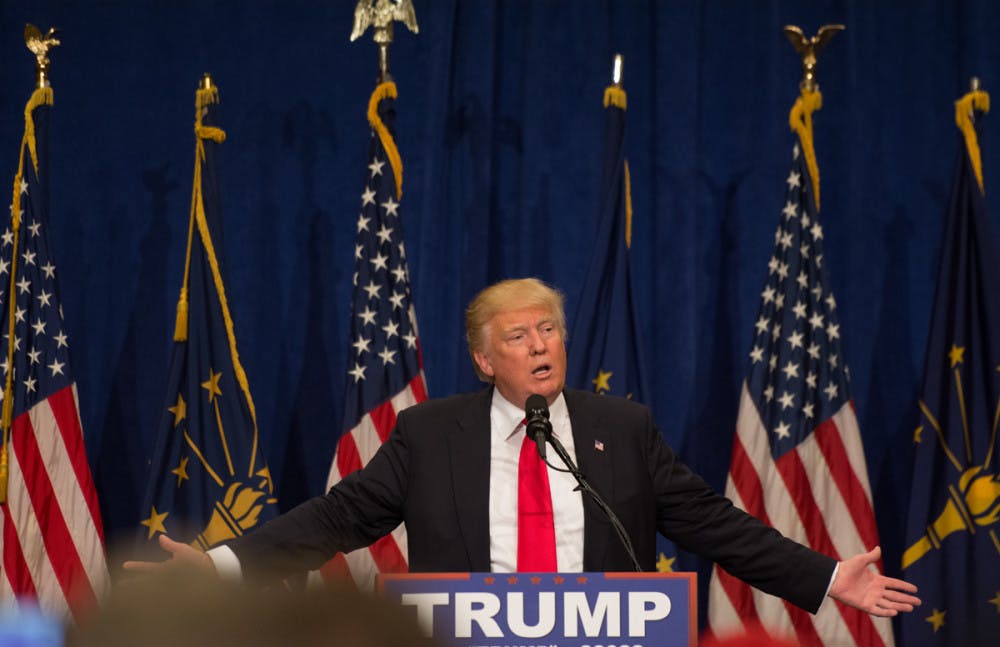On Jan. 18, Notre Dame Law professor Derek T. Muller submitted an amicus brief that didn’t support either party in the Trump v. Anderson case. The case, which is being heard in the U.S. Supreme Court on Thursday, is an appeal from Colorado’s Supreme Court, which found in a 4-3 majority that Donald Trump is ineligible to run for president due to actions related to the Jan. 6 riot at the Capitol. Since Colorado declared him ineligible, Trump cannot appear on the Colorado Republican primary ballot.
Through the lens of federal election law, Muller’s brief detailed the legal authority states have in judging presidential candidates’ qualifications and mentioned that states are under no mandate to do so. He provides historical accounts of instances in which states have excluded candidates. This case could shape other election law cases, Muller wrote.
Muller described the plaintiff’s argument and said, “The basis for saying Trump should not appear on the primary ballot is that he engaged in insurrection under Section Three of the 14th Amendment.”
He also commented on the influence of this case on the general election.
“While this is formally just still a presidential primary case, it will affect how we view the presidential election,” Muller said.
This summer, the Republican National Convention will meet to recognize the delegates from the states and determine the party’s 2024 nominee.
“If he is left off ballots in some of those states, he could still win the nomination if there are no other candidates, but you are then placed in a difficult position as a party,” Muller said. “The Courts declared he is ineligible, so do you want a candidate to not appear on the ballot in all fifty states?”
Muller described how the definition of insurrection will affect the court’s verdict. The word “insurrection” is used in Section 3 of the 14th Amendment, which was originally intended to prevent Confederate officers from gaining power after the Civil War. This is the part of the Constitution — the disqualification clause — that the Colorado Supreme Court said Trump violated.
“Legal historians have looked at what the words insurrection and rebellion mean as legal terms in the mid-19th century. Some people say it means a level of force akin to something like the Civil War, saying that’s the context in which it was drafted.” He continued, “But there are others, which the Colorado Supreme Court agreed with, that believe it can be lesser exercises of force. It can be multiple people gathering together in a violent uprising for a public purpose, and that distinguishes it from ordinary violence or rioting.”
Muller said, “The question is: What level of violence you need to move from what you might describe as an ordinary mob or riot into something that the Constitution defines as an insurrection or rebellion?”
Those who believe Jan. 6 to be an insurrection argue that the rioters resisted the government as an institution and intentionally tried to prevent at transfer of power. “The Civil War was resisting the government by force as an institution, not like resisting the police,” Muller said. Those who agree with the Colorado court “think there was a public purpose, in this instance, to prevent a transfer of power by preventing the counting of electoral votes,” he added.
He also presented the opposite side’s argument that those who entered the Capitol were only expressing frustration as a mob rather than a group of insurrectionists set out to destroy or resist the government.
“There are lots of things that look like they’re resisting the government but are really mobs that have gotten out of control. In this case, [the rioters] were just trying to express their frustration to Congress and not actually prevent the counting of electoral ballots, and certainly not very successfully,” he said. “They got back and counted several hours later. While it was a very scary and violent way, it is not a dimension that rises to the level of insurrection.”
Before addressing qualifications for insurrection, Trump is arguing that this part of the Constitution does not apply to him. According to Section 3 of the 14th Amendment, the law applies to those “under the United States.” Trump is arguing that the president is not part of the named groups, Muller said.
“You are barred from serving as a senator, representative, elector of [the] president or vice president, or any office, civil or military, under the United States at any time. Trump’s argument is that they don’t name the president,” Muller said. “The phrase ‘office under the United States’ refers to lower offices [and] to people who are appointed by the president such as the cabinet.”
The Colorado Supreme Court said the phrase “officers of the United States” was understood in the mid-19th century as essentially embracing everyone, including the president, Muller explained.
He also discussed the claim that Trump participated in the Jan. 6 attack. “Trump obviously did not storm the capital that day and did not engage in rioting. But he certainly spoke aggressively and vociferously in the days leading up to Jan. 6. He led a rally at the Ellipse minutes before there was a riot at the Capitol,” Muller said. “In his speech, he uses language like ‘We’re going to fight.’ And so there, that language and rhetoric suggest that he incited this crowd to violence.”
Muller also discussed how Trump is arguing in defense of his actions. He said that Trump believes that when he told his supporters to fight, he meant peacefully and that he can’t be held responsible for other people’s actions. He explained that Trump feels that he is protected under the First Amendment and has the right to freedom of speech that can’t be subjected to criminal penalties.
“If that’s the case, Trump says ‘My speech is protected, and I can’t have been argued to be engaged in insurrection,’” Muller said.
When asked about his predictions for the case, Muller said he believes that Trump will win the appeal. For the Colorado court’s ruling to be struck down, the U.S. Supreme Court has to find only one problem with the current arguments in favor of keeping Trump off the primary ballot. That legal doubt could be about the application of disqualification clause, the definition of insurrection or whether Trump’s words qualify as incitement as opposed to protected free speech. To uphold the ruling, the nation’s highest court would have to agree with Colorado’s rationale for each of those elements.
“I think it’s a matter of math. For the plaintiffs to win, you must win on every element of the case. For the defendant to win, you only must disprove one of those. I think the court will coalesce around one argument and disprove it.” He continued, “There’s a lot of directions the court could go, and I have a lot of uncertainty.”
Editor’s Note: A former version of this story incorrectly stated that Muller said he thinks Trump will be acquitted. The accurate statement is that Muller said Trump will likely win the appeal. The Observer regrets this error.










